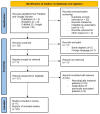Total Esophagogastric and Cologastric Dissociation in Neurologically Normal Children: Systematic Review
- PMID: 35883983
- PMCID: PMC9325012
- DOI: 10.3390/children9070999
Total Esophagogastric and Cologastric Dissociation in Neurologically Normal Children: Systematic Review
Abstract
Total esophagogastric dissociation (TEGD) was first described by Bianchi as a definitive procedure for gastroesophageal reflux disease (GERD) in neurologically impaired children. In the last 20 years, different centers extended the indication to neurologically normal (NN) patients with GERD associated with congenital or acquired esophageal anomalies. The aim of this paper is to analyze the role of TEGD in this cluster of patients. A PubMed and Google Scholar search was conducted. All cases of NN children who underwent TEGD for GERD were collected. Patient characteristics and outcomes were analyzed. Complications were classified according to Clavien-Dindo classification. Forty-eight children were identified. In 56.25%, TEGD was the first anti-reflux procedure, while in 43.75% it was performed after failed fundoplications. Mean follow-up was 5.5 years. Mortality related to surgery was 2.08%. All of the survivors improved their condition, with resolution of GERD and weight gain. In addition, 50% of children weaned off enteral nutrition, with 14.6% having their gastrostomy removed, while 41.67% maintained partial enteral supplementation. Respiratory symptoms almost disappeared in 54.17% of patients. This review suggests that TEGD can also be considered for NN children where conventional methods seem insufficient to control reflux and preserve pulmonary function. Nevertheless, long-term follow-up is still required.
Keywords: esophageal atresia; gastroesophageal reflux; neurologically normal children; total esophagogastric dissociation.
Conflict of interest statement
The authors declare no conflict of interest.
Similar articles
-
Total esophagogastric dissociation (TEGD): Lessons from two decades of experience.J Pediatr Surg. 2019 Jun;54(6):1214-1219. doi: 10.1016/j.jpedsurg.2019.02.031. Epub 2019 Feb 28. J Pediatr Surg. 2019. PMID: 30898397
-
Reflux in esophageal atresia, tracheoesophageal cleft, and esophagocoloplasty: Bianchi's procedure as an alternative approach.J Pediatr Surg. 2005 Apr;40(4):666-9. doi: 10.1016/j.jpedsurg.2005.01.004. J Pediatr Surg. 2005. PMID: 15852275
-
Total esophagogastric dissociation (TEGD) in neurologically impaired children: the floor to parents.Updates Surg. 2022 Dec;74(6):1881-1887. doi: 10.1007/s13304-022-01384-5. Epub 2022 Sep 21. Updates Surg. 2022. PMID: 36129620 Free PMC article.
-
Indications for total esophagogastric dissociation in children with gastroesophageal reflux disease.Surg Today. 2018 Nov;48(11):971-977. doi: 10.1007/s00595-018-1636-9. Epub 2018 Feb 12. Surg Today. 2018. PMID: 29435660 Review.
-
Gastroesophageal reflux in children with neurological impairment: a systematic review and meta-analysis.Pediatr Surg Int. 2018 Nov;34(11):1139-1149. doi: 10.1007/s00383-018-4335-0. Epub 2018 Aug 13. Pediatr Surg Int. 2018. PMID: 30105496
Cited by
-
Surgical Management of Gastroesophageal Reflux in Neurologically Impaired Children: Fundoplication vs. Total Esophagogastric Dissociation.J Clin Med. 2025 Feb 7;14(4):1058. doi: 10.3390/jcm14041058. J Clin Med. 2025. PMID: 40004585 Free PMC article.
References
-
- Quitadamo P., Papadopoulou A., Wenzl T., Urbonas V., Kneepkens C.M.F., Roman E., Orel R., Pavkov D.J., Dias J.A., Vandenplas Y., et al. European pediatricians’ approach to children with ger symptoms: Survey of the implementation of 2009 NASPGHAN-ESPGHAN guidelines. J. Pediatr. Gastroenterol. Nutr. 2014;58:505–509. doi: 10.1097/MPG.0b013e3182a69912. - DOI - PubMed
-
- Madre C., Serhal L., Michaud L., Bonnevalle M., de Lagausie P., Gottrand F., Bonnard A., Hugot J.-P. Prolonged enteral feeding is often required to avoid long-term nutritional and metabolic complications after esophagogastric dissociation. J. Pediatr. Gastroenterol. Nutr. 2010;50:280–286. doi: 10.1097/MPG.0b013e3181a159fa. - DOI - PubMed
-
- Lansdale N., McNiff M., Morecroft J., Kauffmann L., Morabito A. Long-term and “patient-reported” outcomes of total esophagogastric dissociation versus laparoscopic fundoplication for gastroesophageal reflux disease in the severely neurodisabled child. J. Pediatr. Surg. 2015;50:1828–1832. doi: 10.1016/j.jpedsurg.2015.06.021. - DOI - PubMed
Publication types
LinkOut - more resources
Full Text Sources


